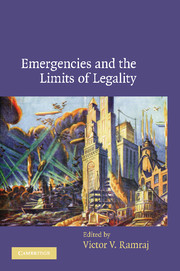Book contents
- Frontmatter
- Contents
- List of contributors
- Preface
- Introduction
- PART ONE Legality and extra-legality
- PART TWO Conceptual and normative theories
- PART THREE Political and sociological theories
- PART FOUR Prospective constraints on state power
- 9 Emergency strategies for prescriptive legal positivists: anti-terrorist law and legal theory
- 10 The ordinary law of emergencies and democratic derogation from rights
- 11 Presidentialism and emergency government
- PART FIVE Judicial responses to official disobedience
- PART SIX Post-colonial and international perspectives
- Index
- References
11 - Presidentialism and emergency government
Published online by Cambridge University Press: 10 August 2009
- Frontmatter
- Contents
- List of contributors
- Preface
- Introduction
- PART ONE Legality and extra-legality
- PART TWO Conceptual and normative theories
- PART THREE Political and sociological theories
- PART FOUR Prospective constraints on state power
- 9 Emergency strategies for prescriptive legal positivists: anti-terrorist law and legal theory
- 10 The ordinary law of emergencies and democratic derogation from rights
- 11 Presidentialism and emergency government
- PART FIVE Judicial responses to official disobedience
- PART SIX Post-colonial and international perspectives
- Index
- References
Summary
Liberal democracy comes in many different shapes and sizes. We find presidents and prime ministers, strong courts outfitted with constitutional review authority as well as weak courts deferential to the legislature, written and unwritten constitutions, bicameralism and unicameralism and a seemingly infinite variety of complex institutional mixtures and compounds. Does this matter for emergency government? Of course it does. Has the post-9/11 debate about emergency power paid proper attention to institutional diversity within contemporary liberal democracy? Probably not. Too many recent attempts to formulate convincing liberal democratic models of emergency law neglect the special challenges posed by presidentialism. Especially in presidential systems, the executive possesses strong incentives to exploit, perpetuate and sometimes even manufacture crises. Any plausible model of emergency government not only must acknowledge the fundamental institutional dynamics of presidentialism, but also needs to figure out how to counteract their potentially deleterious consequences for the rule of law (11.1). Unfortunately, the otherwise provocative ideas of two of the most creative contemporary theoreticians of emergency government, Oren Gross and David Dyzenhaus, fail on this score (11.2, 11.3). Their critical and at times unfairly dismissive responses to those scholars who have at least begun to tackle the challenges of presidentialism obscure some of the crucial questions at hand (11.4).
Let me confess at the outset to at least a certain amount of intellectual and political parochialism.
- Type
- Chapter
- Information
- Emergencies and the Limits of Legality , pp. 258 - 286Publisher: Cambridge University PressPrint publication year: 2008
References
- 3
- Cited by



